- Home
- Juliet Marillier
Wildwood Dancing Page 7
Wildwood Dancing Read online
Page 7
Sten won his wager. By the end of the dance I was dizzy and bruised but happy that his pride was undented. Being from foreign parts, he did seem to feel he must prove himself before the others. I had spared Gogu this adventure and left him in Paula’s care—while he loved to leap, he most certainly didn’t appreciate being thrown about. After that, I danced with Grigori, and Iulia with Sten. Then came a jig and my usual partner for such light-footed capering, the red-bearded Anatolie.
“Your sister’s boatman hasn’t claimed his dance,” the dwarf said with a wink as we twirled arm in arm.
“Really?” That was a surprise. “Perhaps he doesn’t dance. It doesn’t seem like the kind of thing Night People would enjoy.” I let go his arm to jig three paces right, jump, and clap.
“The others are dancing. Look,” said Anatolie, executing his own jump with flair and clapping his hands over his head.
So they were. A black-booted man, his features like a tragic carving in pale stone, circled with a black-gowned woman, her scarlet lips unsmiling, her raven head held like a queen’s. A jig? Not for them—they moved to some silent, dark music that was all their own. Around them the rest of the Night People moved in concert, pallid and haughty. The jostling, jumping throng of other folk kept their distance. Across the sward, the stately Ileana partnered her consort, Marin. They were not above a jig, though they performed it with the air of nobles playing at peasants—drolly indulgent.
“Each to his own, eh?” chuckled Anatolie, seizing both my hands for a prance down the sward. “Nobody does it as well as we, Mistress Jenica! Kings and queens, lords and ladies—what do we care about them?”
“Shh!” I hissed as the music came to a close. “Ileana might hear you. Offend the queen of the forest, and even a dwarf could find himself in very nasty trouble. Now why don’t you go and dance with Iulia? I need a rest.”
I found a little space to one side of the sward and stood there awhile, watching. I counted my sisters: Iulia, dancing, and Stela sitting on the grass with her friends, making chains of flowers. Paula deep in debate with the scholars, while Gogu, on their table, sniffed at the flask of plum brandy. Paula said something to him and he hopped back to her. Tati …
Not dancing. I had not seen her out on the sward all evening, and she loved to dance. What about the beautiful new gown over which we’d all slaved until our fingers ached? Surely she must want to be out there showing it off—it would look magical under the colored lights of Dancing Glade. I glanced about. Where was she? And where was the young man in the black coat? My heart skipped a beat. Our rules were sacrosanct; we never broke them. No going into the forest on your own. No leaving the glade until home time.
I started to panic, something I never did. My pulse raced and my palms grew sweaty. Night People … bloodsuckers. I made myself look systematically across the crowded glade—up, down, this way, that way.… Those others were there, with their waxen skin and dead eyes, but not the somber youth. My younger sisters were all accounted for, but there was no sign of Tati. A terrible doubt crept into my mind. The exquisite fabric, the frenzy of sewing … Surely Tati hadn’t planned this all along? Wishing to be beautiful not to dazzle the throng of revelers, but just for him? If it was true, it would be the first time my sister had ever kept something secret from me.
I began a search, starting with Paula’s table. “Have you seen Tati?”
“No,” said Paula. “Here, take Gogu—he keeps trying to drink the ţuicǎ. Shell be here somewhere, don’t worry.”
“I’m not,” I lied, and elbowed my way through the crowd to Stela’s group and their daisy chains. I squatted down beside her. “Stela, have you seen Tati?”
“No. Not that one, Ildephonsus, the stem is too narrow. Let me show you—”
Ildephonsus, a creature with a snuffling pink snout and gauzy wings, leaned close as Stela demonstrated the best way to add a daisy to the chain, which was now immensely long and wound many times around the circle of busy artisans. I left them to their work.
Iulia danced past me, the tired face and ill temper of recent days entirely gone. She was all smiles, her blue eyes sparkling. I still couldn’t see Tati. “Where is she, Gogu?” I muttered.
“Jena?” My sister’s voice came from just behind me and I jumped as if I’d been struck.
“Tati! Where were you?” I bit back more words: I was worried about you, I thought you’d gone off.… “You still have your cloak on,” I said, surprised. “Why aren’t you dancing?”
“Maybe later.” It seemed to me that her smile was evasive. “I saw you looking for me. I’m fine, Jena. Just go on and enjoy the party.”
It was then that I saw, over her shoulder and at some distance—but clearly waiting for her—the young man in the black coat. His features bore their usual forlorn look, like that of a loyal dog unfairly reprimanded. The dark eyes belied that expression: I saw a message there that scared me. Gogu shifted on my shoulder. He’s trouble. I swallowed and found my voice. “Are you going to introduce me to your new friend?” I croaked.
“Oh. You mean Sorrow? I don’t think he’s quite ready for that, Jena.”
“Who?” I couldn’t have heard her correctly.
“Sorrow.” She glanced at Black Coat, her lovely features softening in a way that set a chill premonition in my heart.
“I bet that’s not his real name,” I snapped, anxiety making me cruel. “His parents probably called him something plain and serviceable, like Ivan. Ah, well, pretentious coat, pretentious name.”
Tati stared at me. She looked as if she might burst into tears or slap me. We never argued.
Now you’ve done it.
“Shut up, Gogu,” I muttered, furious with myself. “Tell him you can’t talk to him,” I hissed to my sister under my breath. “He’s one of them. Don’t you understand how dangerous that is?” Then I turned on my heel and plunged back into the crowd.
I didn’t dance much after that. I watched the two of them as they went back into the shadows under the trees—she in her night-blue cloak, he in his long black coat—not touching, not even so much as fingertips, but standing close, so close each might have felt the whisper of the other’s breath on half-closed lids or parted lips. They were talking. At least, Tati was talking, and Sorrow was doing a lot of listening and putting in a word or two, here and there, though he was certainly not given to opening his mouth very far.
I watched them as the night drew toward dawn and the jigs and reels and high-stepping dances of the earlier hours gave way to slower tunes, music for lovers. Iulia sat on the bank, watching, her eyes full of dreams. Stela was stretched out with her head on Ildephonsus’s stomach, half-asleep. A couple of hedge sprites were making nests in her hair. At Paula’s table, the arguments raged on; did scholars never grow weary?
Tati took off her cloak. Sorrow folded it and laid it among the roots of an oak, his eyes never leaving her. A shaft of moonlight illuminated my sister in her delicate gown—her hair tumbling down her back as dark and shiny as a crow’s wing, the curves of her body revealed through the sheer, floating silk. She reached out a hand; Sorrow took it in his as if it were something precious. There was no longer a shred of doubt in my mind that Tati had worn the butterfly gown for him. It was a gift—a gift for his eyes only.
They danced. All by themselves, beyond the farthest fringe of the crowd, they circled and swayed, met and parted, turned and passed. Even when the steps of their dance drew them apart, their heads turned to look, and look, and look, as if they would drown in each other’s eyes.
“What is she thinking of, Gogu?” I whispered. “She must have gone mad!”
I’m cold. Gogu gave an exaggerated shiver. Can we go home now?
Why didn’t it surprise me that Tati was the last sister to come down to the boats? I saw where Sorrow had beached their craft at some distance along the shore, half concealed by reeds. I stood with Sten as my other sisters stepped into their boats and headed off across the lake with their escorts. The mist wreath
ed the water thickly in this predawn hour: in the swirling white I could see strange shapes—wyvern, dragon, manticore. Gogu’s trembling felt about to dislodge him from my shoulder. I tucked him into the glove and into the pocket. “It’s all right, Gogu.”
Dawn, I thought. Since last Full Moon, I had asked Paula a lot of questions about Night People. She’d told me they lost their powers with the rising sun. If I could get Tati out of here safely, she’d come back to herself. Once home, I would be able to make her see sense. Just as long as she could drag herself away in time.
“Ready?” Sten had one big foot in the boat, one on the shore, and a hand extended to help me aboard.
“I’m waiting for my sister.”
“She’s there.” The troll jerked his head. It was true. In the moment I had turned away, Tati and Sorrow had emerged from the trees, a discreet distance apart: he with her cloak over his arm, she a vision in the sheer embroidered gown. Once she set foot on the home shore, she would be freezing.
“Good,” I said grimly. “Let’s go.”
Sten was in fine form. We crossed the Bright Between in a trice, leaving a pathway of roiling water and splintered ice behind us. Next in was Iulia with Grigori, followed by Paula and then Stela. The air on this side was so chill I could feel my face going numb. Deep in the pocket, Gogu was immobile.
We waited, huddled into our cloaks and hats and mittens, trying to escape the cold.
“Hurry up, Tati,” muttered Paula. “It’s hardly a morning for a leisurely boating expedition.”
We waited longer. Sten picked his teeth. The dwarf tapped his foot, sighing loudly. Grigori put his arms around Iulia to keep her warm.
“He’d want to make haste,” said the dwarf. “The sun will soon be up.”
The boat’s high prow broke the mist then, coming slowly. It touched the shore a little way from us. Tati alighted, still without cloak, hood, or boots. Sorrow got out after her. She turned her back to him; he unfolded her blue cloak and placed it around her shoulders. He did not touch my sister an instant longer than was necessary, and yet there was something in the way his hands lingered above her shoulders, as if he would embrace her if he dared, that was as tender as any caress might be.
Tati turned to thank him. He bowed his head, then took her hood and boots from the boat and gave them to her. We waited while she put them on, balancing with one hand on Sorrow’s shoulder to take off her dancing slippers. He stood immobile, pale face set, eyes bleak. The name he had chosen was apt enough; I had never seen anyone with so many different ways of looking sad.
“Goodbye,” I heard Tati say, but Sorrow said nothing at all. His eyes spoke for him.
“Come on, Tati,” mumbled Iulia through chattering teeth. “It’ll be time to get up before we even go to bed.”
Above us, beyond the swirling mist that blanketed the water, the sky was beginning to lighten. The other boatmen were climbing aboard their craft. None wished to be on this shore at sunrise.
Tati reached up a hand. She brushed Sorrow’s cheek with her fingers, as lightly as the touch of a butterfly on a flower. He closed his eyes, and the ashen pallor of his cheeks warmed with the faintest of blushes. An instant later Tati was by my side and, to the tinkling music of ice fragments shifting in the water and the solitary hoot of an owl, five little boats slipped away through the mist to the Other Kingdom.
We’re safe, I told myself as always. But it seemed to me that although we had crossed the margin to our own world and were on our way home once more, this was no longer true.
Vǎrful cu Negurǎ was full of lovely things. The house had floors of marble and of fine polished wood, broad passageways, and sweeping staircases, and it was tended by a host of well-trained servants. Aunt Bogdana’s coffee cups were of fine porcelain, and she served tiny, exquisitely decorated cakes. For a woman who values beauty, a merchant makes a good husband.
It was the day of the autumn stag hunt, and Paula and I were keeping our aunt company. We were expecting to drink a lot of coffee before the day was over. Aunt Bogdana’s maidservant Daniela moved quietly in and out of the sewing room to replenish the refreshments. Uncle Nicolae and Cezar had ridden out early, armed with crossbows and accompanied by a troop of men from the district, dogs at heel. We had been invited to ride with them, as several women were accompanying their husbands and it was considered quite respectable for us to go along. Iulia was the only one of us who had accepted. She loved to ride, and the lack of a horse of her own had long been a sore point.
Hunting did not appeal to me. The forest king, Marin, with his golden hair and noble bearing, had often reminded me of a stag in his prime. I sensed there was not much difference between other hunt quarry such as wolf, boar, or wildcat and certain of the stranger denizens of the Other Kingdom. Besides, it wasn’t fair to leave Paula to entertain Aunt Bogdana on her own. Stela had a cold, and Tati had been all too willing to stay home and tend to her.
“I’m sorry Tatiana could not be here today. I wanted to have a word with her,” Aunt Bogdana said, sipping her coffee. “But I do applaud her responsibility in watching over little Stela. Of course, at sixteen Tati should be married and thinking about children of her own. It’s time you older girls were introduced to a wider circle of eligible young men. Don’t look at me like that, Jenica. Your father’s a man—he doesn’t understand that suitors won’t simply come knocking on the door. One does need to act. In your own case, some attention to grooming and deportment would not go astray. Teodor will be wanting to see you settled securely. Especially now, with his health so frail.” She set the tiny cup down. “You must look to your future, girls.”
I saw the expression on Paula’s face and spoke swiftly. “Father’s physician told him he’d likely make a full recovery,” I said. It was only a slight embroidery of the truth. “He just needs rest and warm air.”
Aunt Bogdana was not easily diverted. “A party,” she said, eyeing me sharply. “That’s what Teodor should have done, given a grand party for you, with music and dancing—an opportunity for you to mingle with the young men of the district. As it is, you never go out. Nobody ever sees you. I wonder if Nicolae would agree to hold some kind of entertainment here? He does love his music.”
There was a wistful look on my aunt’s face. She wore her hair covered by a demure lace cap, and her gown, though of the finest fabric, was plain in design and dark in color. I thought I could remember a time, before Costi’s death, when she had dressed in bright silks and worn feathers in her hair. There was a picture of him on a shelf near her chair, right next to an icon of Saint Anne. The little painting had been done on Costi’s tenth birthday. I could not look at it without feeling the terror of being on the raft and drifting away, away, into the mist. Looking into Costi’s painted eyes, I saw Cezar’s frightened tears and heard his voice stumbling through the story.…
“We do go out, Aunt Bogdana,” Paula said as she darned the worn heel of a stocking. We had brought a basket of mending with us, anticipating a long day. “What about church in the village? We meet everyone there. Father’s taken us to all the guild houses in Braşov. We do see people.”
“There’s seeing and seeing,” Aunt Bogdana said weightily. “Conducting business in merchants’ counting-houses is hardly the same as dressing up and letting folk look at you. A young man needs to view a girl at her best. A young woman clad for dancing is like a dewy flower—she catches and holds the eye.”
I met Paula’s glance and looked hastily away. Gogu poked his head out of my pocket. If you were a flower, you’d be pondweed.
“We won’t be having any parties until Father is back home,” I said. “But thank you for the suggestion, Aunt.”
Aunt Bogdana glanced at me. “Jenica,” she said, “for a girl of fifteen, you are somewhat bold in your responses.” Her tone was kindly; I knew she meant well. “Your father …” She sighed. “He’s a lovely man, but he will insist on going his own way, and that does you no favors, my dear. Suitors won’t care in the least whet
her you can add up figures and tell silk from sarcenet or jade from amber. It all boils down to manners and deportment, dress and carriage. And the need to keep your conversation appropriate. The frog is an issue. He may be a nice little creature, but he does tend to leave damp patches on your clothing.”
“Yes, Aunt.” There was no point in arguing. Aunt Bogdana was the valley authority on what was proper. “Cezar has already mentioned it.”
“Ah, Cezar …” With another sigh, Aunt set down her cup. Her eyes were on Costi’s picture. Daniela got up and bore the tray away. “Life can be very cruel, my dears, cruel and arbitrary,” Aunt went on. “I think sometimes it is particularly hard for women, as we cannot so easily divert ourselves with business affairs.”
“Some women do,” muttered Paula to her stocking.
“What was that, Paula?” Aunt Bogdana had sharp hearing.
“It’s true, Aunt,” I said, drawn into debate despite my best intentions. “Marriage and children need not be the only future open to us. Father speaks of women in Venice and other foreign parts who wield great influence in merchant ventures—women who manage business enterprises in their own right. I’m already helping Father quite a bit, learning as much as I can—”
“Say no more, Jena. That is not a path you can seriously contemplate. Such women are not … respectable. At your age you cannot fully understand what I allude to. Only a certain kind of female seeks to enter the masculine realm of commerce, or indeed”—she glanced at Paula—“that of scholarship. Our strengths lie in the domestic sphere. A truly wise woman is the one who knows her place. You need suitable husbands. They won’t just chance along. You must make an effort. Being a man, your father simply doesn’t understand. That he has never provided dancing lessons for you illustrates that. There is no point in appearing at a party if all you can do is step on your suitors’ toes. Don’t smirk, Paula. This is not a joking matter.”
“No, Aunt,” we chorused.

 Den of Wolves
Den of Wolves Flame of Sevenwaters
Flame of Sevenwaters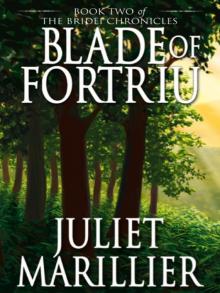 Blade of Fortriu
Blade of Fortriu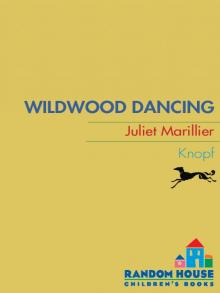 Wildwood Dancing
Wildwood Dancing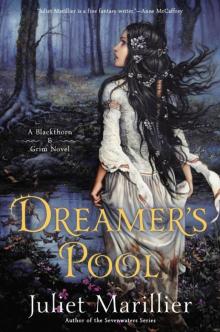 Dreamer's Pool
Dreamer's Pool Raven Flight
Raven Flight Heir to Sevenwaters
Heir to Sevenwaters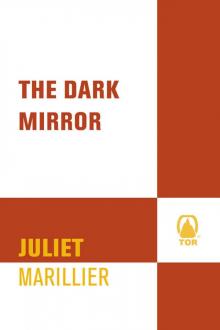 The Dark Mirror
The Dark Mirror Daughter of the Forest
Daughter of the Forest Seer of Sevenwaters
Seer of Sevenwaters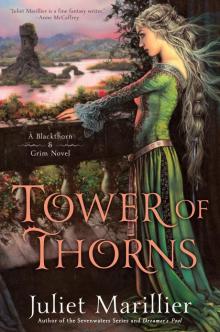 Tower of Thorns
Tower of Thorns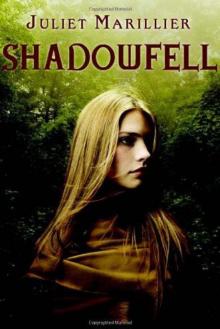 Shadowfell
Shadowfell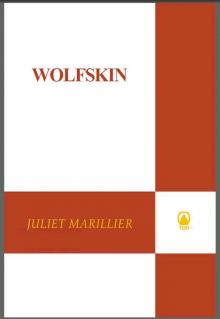 Wolfskin
Wolfskin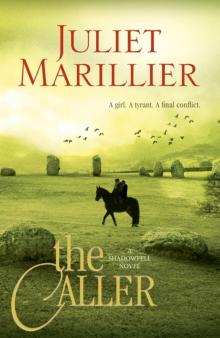 The Caller
The Caller Foxmask
Foxmask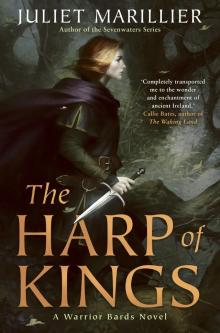 Harp of Kings
Harp of Kings The Well of Shades
The Well of Shades Heart's Blood
Heart's Blood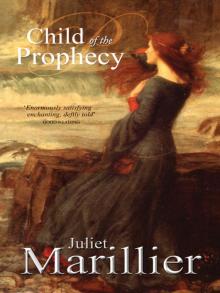 Child of the Prophecy
Child of the Prophecy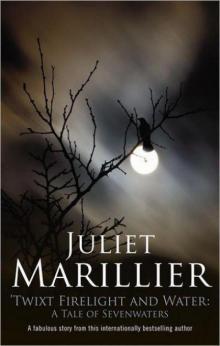 Twixt Firelight and Water
Twixt Firelight and Water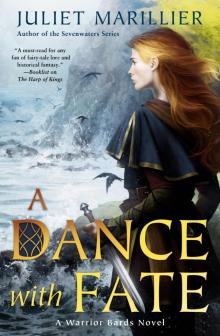 A Dance with Fate
A Dance with Fate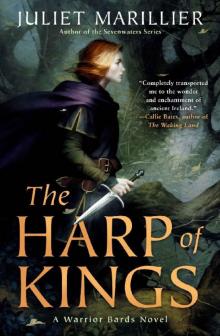 The Harp of Kings (Warrior Bards)
The Harp of Kings (Warrior Bards)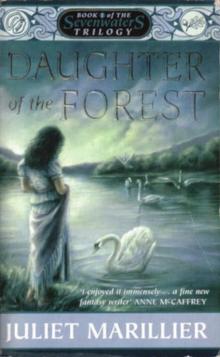 Daughter of the Forest (The Sevenwaters Trilogy)
Daughter of the Forest (The Sevenwaters Trilogy)![Sevenwaters [06] Flame of Sevenwaters Read online](http://i1.bookreadfree.com/i2/04/08/sevenwaters_06_flame_of_sevenwaters_preview.jpg) Sevenwaters [06] Flame of Sevenwaters
Sevenwaters [06] Flame of Sevenwaters![[Sevenwaters 04] Heir to Sevenwaters Read online](http://i1.bookreadfree.com/i2/04/12/sevenwaters_04_heir_to_sevenwaters_preview.jpg) [Sevenwaters 04] Heir to Sevenwaters
[Sevenwaters 04] Heir to Sevenwaters